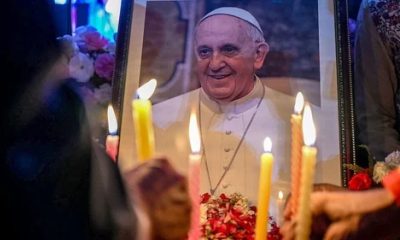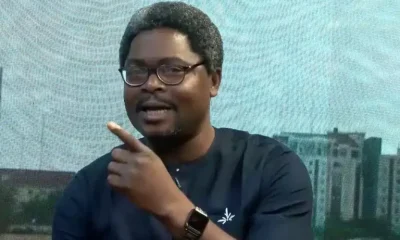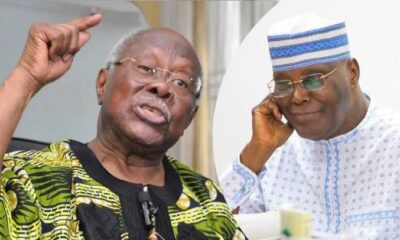Foreign
South Africa’s Ramaphosa Re-Elected After Coalition Deal

South Africa’s President Cyril Ramaphosa was re-elected for a second term on Friday after his humbled ANC cobbled together an unprecedented coalition government.
Lawmakers in Cape Town voted overwhelmingly to put Ramaphosa, 71, back in office for another five years after the May 29 general election that produced no outright winner.
“I accordingly declare honourable M.C. Ramaphosa duly elected President,” Chief Justice Raymond Zondo said after the votes were counted.
Last month’s election marked a historic turning point for South Africa, ending three decades of dominance by the African National Congress of the late Nelson Mandela.
The party that led the struggle to end apartheid won only 40 percent of the vote and, for the first time, lost its absolute majority in parliament.
It has now struck a deal to form what it calls a government of national unity.
ANC Secretary General Fikile Mbalula said on Friday the broad coalition brings together a majority of the 18 parties that won representation in the 400-seat National Assembly.
These include the centre-right Democratic Alliance (DA), the Zulu nationalist Inkatha Freedom Party (IFP) and other smaller groups.
Ramaphosa was re-elected by fellow MPs with 283 votes in a secret ballot.
He saw off a last-minute challenge by Julius Malema, the firebrand leader of the radical leftist Economic Freedom Fighters (EFF), whose candidacy gained 44 votes.
Ramaphosa will be sworn in next week in Pretoria and then unveil his new cabinet.
Earlier, Zondo had opened the parliament’s first sitting, swearing in MPs in batches ahead of votes on the election of a speaker and deputy speaker.
The first post went to the ANC’s Thoko Didiza and, in a first sign the power-sharing deal was working, the second went to the DA’s Annelie Lotriet. Both are women.
Lawmakers cast their ballot one by one in a lengthy ceremony held in a Cape Town convention centre, as the parliament building is being rebuilt after a 2022 fire.
EFF members took the oath wearing red overalls and in some cases rubber boots and plastic construction worker helmets.
They declined to support the incoming administration, having refused to countenance joining an alliance with right-wing or white-led parties.
“This is not a government of national unity, this is a grand coalition between the ANC and white monopoly capital. History will judge you harshly,” Malema said after conceding defeat.
Graft-tainted former president Jacob Zuma’s new party uMkhonto weSizwe (MK), which came third in the May 29 election, has disputed the results and its MPs boycotted Friday’s sitting.
“The sitting of the national assembly today as far as we’re concerned is illegal and unconstitutional,” MK spokesman Nhlamulo Ndhlela told AFP.
A former trade unionist turned millionaire businessman, Ramaphosa will preside over a government combining radically different political views.
The ANC is a historically pan-Africanist, progressive party of the left that has overseen welfare and economic empowerment programmes for poor, black South Africans.
The largest coalition party, the DA, pushes a liberal, free-market agenda. Smaller parties that are understood to have agreed to join the government range from the left to the far right.
“At the heart of this government of national unity statement is a shared respect and defence of our constitution and the rule of law,” DA leader John Steenhuisen said.
The agreement extended to Johannesburg’s Gauteng province and KwaZulu-Natal.
Zuma’s MK won the most votes in the latter but was left empty-handed as coalition members managed to get a wafer-thin majority of 41 out of 80 provincial councillors.
Steenhuisen added that the coalition agreement included a consensus mechanism to deal “with the disagreements that will inevitably arise”.
“This is not the end of the process. And the road ahead will not be an easy one,” Steenhuisen said, explaining that the two-week deadline imposed by the constitution to form a government did not leave enough time to iron out all details.
Ramaphosa first came to power in 2018 after Zuma was forced out under the cloud of corruption allegations.
Under his watch South Africa suffered from record power cuts, the economy languished and crime remained rife. Unemployment is at almost 33 percent.
He will now have the arduous task to bridge conflicting views within government to turn around South Africa’s economic fortunes.
“Rapid, inclusive and sustainable economic growth” was listed as a top priority in a draft of the coalition deal.
GDP grew by only 0.6 percent in 2023 and was down 0.1 percent in the first three months of 2024.
AFP
Foreign
Massive explosion at Iran port kills at least 14 people, injures 750

A massive explosion and fire rocked a port Saturday in southern Iran purportedly linked to a shipment of a chemical ingredient used to make missile propellant, killing 14 people and injuring around 750 others.
Helicopters and aircraft dumped water from the air on the raging fire through the night into Sunday morning at the Shahid Rajaei port. The explosion occurred just as Iran and the United States met Saturday in Oman for the third round of negotiations over Tehran’s rapidly advancing nuclear program.
No one in Iran outright suggested that the explosion came from an attack. However, even Iranian Foreign Minister Abbas Araghchi, who led the talks, on Wednesday acknowledged that “our security services are on high alert given past instances of attempted sabotage and assassination operations designed to provoke a legitimate response.”
State media offered the casualty figures. But there were few details on what sparked the blaze just outside of Bandar Abbas, causing other containers to reportedly explode.
Security firm says port received chemical for missile fuel
The port took in a shipment of the missile fuel chemical in March, the private security firm Ambrey said. The fuel is part of a shipment of ammonium perchlorate from China by two vessels to Iran first reported in January by the Financial Times. The chemical used to make solid propellant for rockets was going to be used to replenish Iran’s missile stocks, which had been depleted by its direct attacks on Israel during the war with Hamas in the Gaza Strip.
“The fire was reportedly the result of improper handling of a shipment of solid fuel intended for use in Iranian ballistic missiles,” Ambrey said.
Ship-tracking data analyzed by The Associated Press put one of the vessels believed to be carrying the chemical in the vicinity in March, as Ambrey said. Iran hasn’t acknowledged taking the shipment. The Iranian mission to the United Nations didn’t respond to a request for comment on Saturday.
It’s unclear why Iran wouldn’t have moved the chemicals from the port, particularly after the Beirut port blast in 2020. That explosion, caused by the ignition of hundreds of tons of highly explosive ammonium nitrate, killed more than 200 people and injured more than 6,000 others. However, Israel did target Iranian missile sites where Tehran uses industrial mixers to create solid fuel.
Social media footage of the explosion on Saturday at Shahid Rajaei saw reddish-hued smoke rising from the fire just before the detonation. That suggests a chemical compound being involved in the blast — like in the Beirut explosion.
“Get back get back! Tell the gas (truck) to go!” a man in one video shouted just before the blast. “Tell him to go, it’s going to blow up! Oh God, this is blowing up! Everybody evacuate! Get back! Get back!”
On Saturday night, the state-run IRNA news agency said that the Customs Administration of Iran blamed a “stockpile of hazardous goods and chemical materials stored in the port area” for the blast, without elaborating.
An aerial shot released by Iranian media after the blast showed fires burning at multiple locations in the port, with authorities later warning about air pollution from chemicals such as ammonia, sulfur dioxide and nitrogen dioxide in the air. Schools and offices in Bandar Abbas will be closed Sunday as well.
Port a major destination for Iranian cargo
Shahid Rajaei has been a target before. A 2020 cyberattack attributed to Israel targeted the port. It came after Israel said that it thwarted a cyberattack targeting its water infrastructure, which it attributed to Iran. Israeli officials didn’t respond to requests for comment regarding Saturday’s explosion.
Social media videos showed black billowing smoke after the blast. Others showed glass blown out of buildings kilometers, or miles, away from the epicenter of the explosion. State media footage showed the injured crowding into at least one hospital, with ambulances arriving as medics rushed one person by on a stretcher.
Hasanzadeh, the provincial disaster management official, earlier told state television that the blast came from containers at Shahid Rajaei port in the city, without elaborating. State television also reported that there had been a building collapse caused by the explosion, though no further details were offered.
The Interior Ministry said that it launched an investigation into the blast. Iranian President Masoud Pezeshkian also offered his condolences for those affected in the blast.
Shahid Rajaei port in Hormozgan province is about 1,050 kilometers (650 miles) southeast of Iran’s capital, Tehran, on the Strait of Hormuz, the narrow mouth of the Persian Gulf through which 20% of all oil traded passes.
Foreign
Judge halts Trump’s shutdown of Voice of America

A federal judge has ordered the Trump administration to restore all jobs and funding for the Voice of America and other US-backed news outlets, ruling that efforts to dismantle it violated the law and Constitution.
Over 1,300 VOA employees, including about 1,000 journalists, were placed on leave following President Donald Trump’s order. The White House has accused the broadcaster of being “anti-Trump” and “radical”.
VOA, still primarily a radio service, was set up during World War II to counter Nazi propaganda, and has become a major global media broadcaster.
The ruling noted that because of the cuts, “VOA is not reporting the news for the first time in its 80-year existence”.
Judge Royce Lamberth said the administration acted “without regard to the harm inflicted on employees, contractors, journalists, and media consumers around the world”.
He ordered the administration to take steps to restore employees and contractors to the jobs they had prior to the executive order, and to do the same for Radio Free Asia and the Middle East Broadcasting Networks.
The judge found the administration also likely violated the International Broadcasting Act and Congress’ power to appropriate funding.
“My colleagues and I are grateful for this ruling. But we know that this is just a small step forward, as the government is likely to appeal,” said Patsy Widakuswara, the VOA White House bureau chief and a lead plaintiff in the lawsuit.
“We are committed to continuing to fight against what we believe is the administration’s unlawful silencing of VOA until we can return to our congressional mandate: to tell America’s stories with factual, balanced, and comprehensive, reporting,” she said.
Trump has long criticised VOA as part of his broader attacks against the media, frequently accusing mainstream outlets of bias.
After taking office in January, he appointed a political ally, Kari Lake, to run VOA. Lake has previously supported Trump’s false claims that the 2020 election was stolen from him.
In March, Trump ordered the US Agency for Global Media (USAGM), which oversees VOA and funds outlets like Radio Free Europe and Radio Free Asia, to be “eliminated to the maximum extent consistent with applicable law”.
A separate judge in New York temporarily blocked the executive order after journalists, advocacy groups and unions sued, arguing the move was unlawful.
Judge Lamberth, who is based in Washington, DC, ruled the Trump administration lacked the authority to shutter VOA, which is funded by Congress and has a legislative mandate to deliver credible news globally.
“It is hard to fathom a more straightforward display of arbitrary and capricious actions than the Defendants’ actions here,” he wrote.
“Even though several courts have ruled that the President can remove personnel and terminate grants, a radical district judge is once again attempting to interfere with the Trump Administration’s efforts to make the government more efficient,” White House spokesperson Taylor Rogers said in a statement.
USAGM did not immediately respond to a request for comment.
Foreign
Pope Francis Death: Italy, Argentina 25 other Countries Declared National Mourning (Full List)

The world stood still on April 21, 2025, as the Vatican officially confirmed the death of Pope Francis, aged 88. His passing marked the end of a historic papacy and triggered an outpouring of grief across continents. Numerous nations, especially those with significant Catholic populations, declared national mourning periods to honor the pontiff’s life, spiritual leadership, and global influence.
From Latin America to Europe, Asia, and Africa, countries initiated solemn observances, lowered national flags to half-mast, and held public commemorations. This article highlights the full list of countries that declared national mourning in memory of Pope Francis.
Why Pope Francis’s Death Resonated Globally
Pope Francis, born Jorge Mario Bergoglio in Buenos Aires, Argentina, was the first Jesuit and the first Latin American pope in the history of the Catholic Church. Since his election in 2013, he championed issues such as poverty alleviation, climate action, interfaith dialogue, and social justice, making him a spiritual leader not just for Catholics, but for people of all faiths.
His legacy transcended religious boundaries, prompting state-led tributes even in non-Catholic majority nations.
List of Countries That Declared National Mourning for Pope Francis
Below is a country-by-country breakdown of declared national mourning periods:
| Country | Mourning Period | Remarks |
|---|---|---|
| Argentina | 7 days (Apr 22–28) | Pope Francis’s homeland; nationwide memorial services held. |
| Brazil | 7 days | Churches and public buildings observed solemn tributes. |
| East Timor | 7 days | Predominantly Catholic nation with extensive observances. |
| Italy | 5 days (Apr 21–26) | Vatican’s host country; held massive state ceremonies. |
| Costa Rica | 4 days | Flags at half-mast; public prayers offered. |
| Spain | 3 days | Public processions and masses conducted. |
| India | 3 days | Interfaith tributes and official condolences shared. |
| Philippines | 3 days | Nation-wide tributes; churches filled with mourners. |
| Poland | 3 days | Mourning coincided with the Pope’s funeral. |
| Portugal | 3 days | Official services in Lisbon and major cities. |
| Lebanon | 3 days | Christian and Muslim leaders offered joint prayers. |
| Venezuela | 3 days | Government-organized memorials. |
| Chile | 3 days | National flags at half-mast; televised funeral services. |
| Cuba | 3 days | Nationwide mourning with Catholic mass ceremonies. |
| Guatemala | 3 days | Memorial services across Catholic institutions. |
| Panama | 3 days | Official decree and observances. |
| Dominican Republic | 3 days | Nationwide religious services held. |
| Paraguay | 3 days | Church bells rang across the country in honor. |
| Peru | 3 days | Large public gatherings held for prayers. |
| Ecuador | 3 days | Tributes from religious and government figures. |
| Puerto Rico | 3 days | Government-declared mourning period observed. |
| Malta | 1 day (Apr 26) | Marked during the Pope’s funeral. |
| Croatia | 1 day | Flags lowered; public messages of condolence shared. |
| Hungary | 1 day | National mourning aligned with funeral rites. |
| Uruguay | 1 day | Ceremonies held in Catholic schools and churches. |
| Cape Verde | 1 day | Special services held across Catholic communities. |
Global Religious and Political Reactions
World leaders, religious figures, and citizens across continents expressed grief and paid glowing tributes to Pope Francis’s legacy. The United Nations, European Union, and African Union all issued statements acknowledging his contributions to world peace, interreligious harmony, and humanitarian service.
In cities like Manila, Rome, Buenos Aires, and Lagos, candlelight vigils were held. Cathedrals rang their bells in synchronized tribute, while mosques and temples also joined in interfaith memorial services.
Pope Francis’s death has left a void in the global religious and moral conscience. His efforts to promote compassion, inclusiveness, and humility in leadership will continue to inspire generations to come.
While the Vatican prepares for a papal conclave to elect a successor, the world continues to reflect on the lessons and legacy of a pope who bridged faith and humanity in unprecedented ways.
The widespread declaration of national mourning in countries around the world highlights just how impactful Pope Francis was—not only to Catholics but to people of all beliefs. His death marks the end of a deeply influential era in the Church’s history.
May his soul rest in peace.
-

 News21 hours ago
News21 hours agoList of World Leaders that are present in the final funeral of Pope Francis
-

 News17 hours ago
News17 hours agoJust in: Gunmen invade pro-Wike group in Bayelsa
-

 News21 hours ago
News21 hours ago2Face estranged wife, Annie Macauley breaks silence after he married Natasha
-

 Politics24 hours ago
Politics24 hours agoUgochinyere remains Nigeria’s number one Hushpuppi of politics-Olayinka carpets Imo Rep
-

 Entertainment21 hours ago
Entertainment21 hours agoMohbad’s Inquest: Pathologist reveals major findings following 2nd autopsy
-

 News19 hours ago
News19 hours agoBaptist Convention to Tinubu: Convene National Security Summit Immediately
-

 Politics2 hours ago
Politics2 hours agoSee list of APC Delta stakeholders holding meeting in Abuja on power sharing formula with Oborevwori
-

 News24 hours ago
News24 hours agoAfter NEC meeting, PDP will be born again– Bode George






